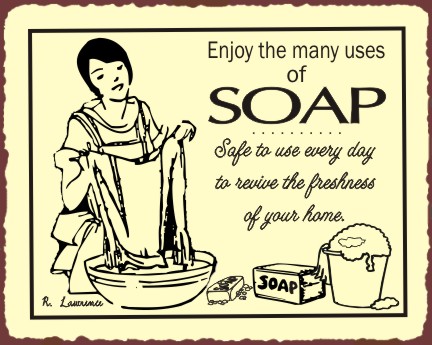|
CAPTURING EVIDENCE (cont.)
Chapter Four stresses the fact that all researchers, including family historians, are never to correct names, dates, signatures, spelling or punctuation when transcribing an original document. Rather, you were given some strategies for noting the differences between what is in the document and what is written today.
The reason this advice is important to follow is because we may not know the social customs or the proper meanings of words in a particular locality and time period. We may inadvertently jump to wrong conclusions.
|
This was sent to me by a researcher friend of mine, Mary Kane of Coldwater, MI. Thought
you might enjoy it. The original spelling was retained. 
|
|
RECIPE FOR DOING THE FAMILY WASH (Written in its original spelling for a bride a few
generations ago).
- bild a fire in back yard to heet kettle of rain water
- set tubs so smoke won't blow in eyes if wind is pert
- shave one hold cake lie sope in bilin water
- sort things, make three piles
- 1 pile white
- 1 pile cullord
- 1 pile work britches and rags
- stur flour in cold water to smooth, then thin down with bilin water
- rub dirty spots on board, scrub hard, then bile, rub collord, but don't bile—just rench & starch
- take white things out of kettle with broom stick handle, then rench, blew, and starch
- spred tee towels on grass
- hang old rags on fence
- pore rench water on flower bed
- scrub porch with hot sopey water
- turn tubs upside down
- go put on cleen dress—smooth hair with side combs—brew cup of tee—set and rest and rock a spell and count blessins
Well, wash day is a far cry from what it was in the days of yesteryear. Thought that you might enjoy this and particularly the spelling of the words. Gives you an idea why names were spelled differently than what they actually were.
|
| [Sorry for being off-topic, but it was so apropos!]
|
Can you indicate in your own data entry, when brackets [ ] would be used?
When would ellipses be used?
Why would you want to use Black's Law Dictionary?
|